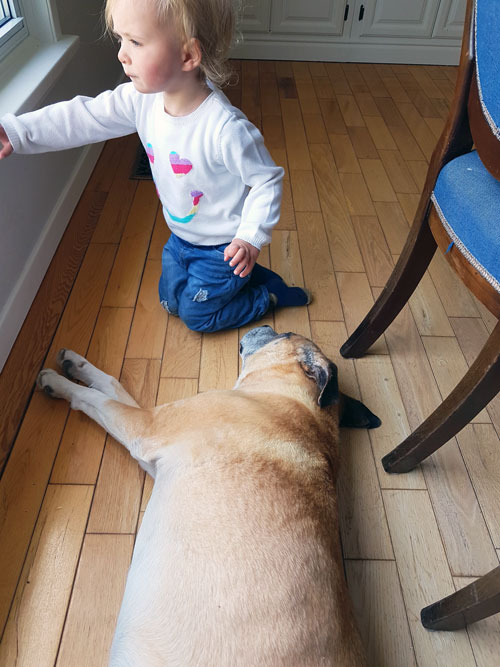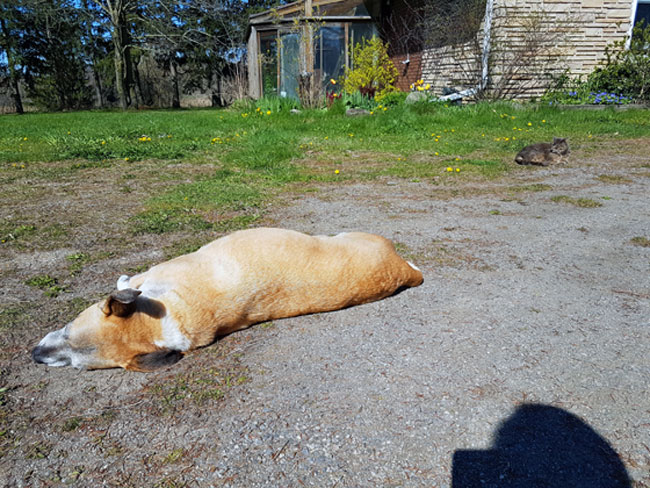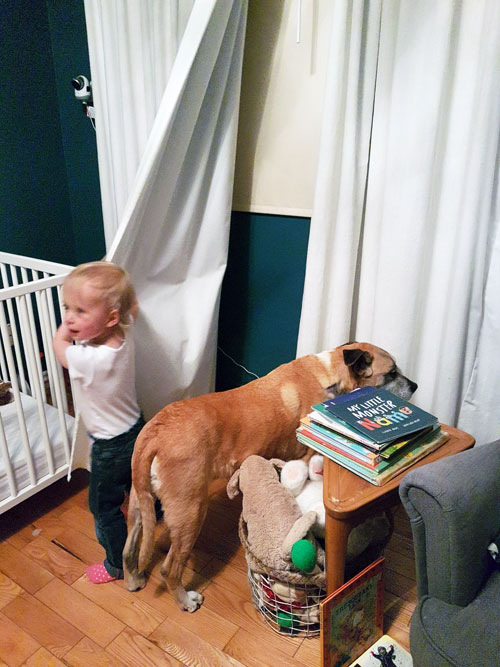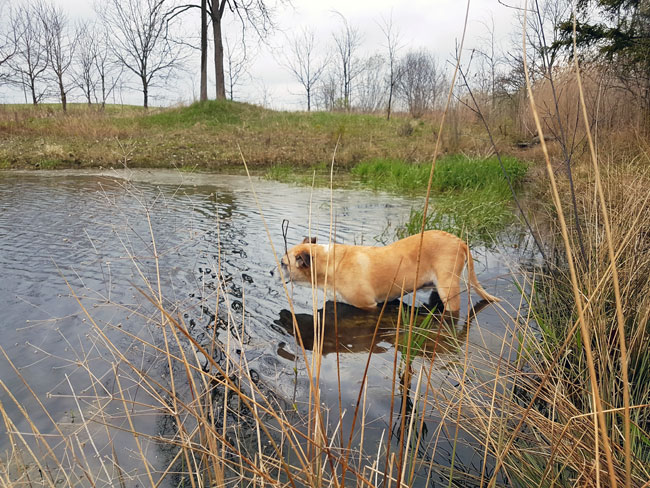About a year earlier, it seemed like something was wrong with Baxter.
Our common low-energy pet came to be inactive.
We went through lots of tests, tried different medications, got in touch with numerous professionals, faced various symptoms and never ever obtained a clear-cut medical diagnosis.
As I shared in my last message, Baxter passed away at the end of May. In the last weeks of his life, he created what our veterinarians called intra-cranial condition. It materialized as a type of pet dog mental deterioration or canine cognitive disorder(CCD ).
Eileen Anderson is a writer and also pet dog proprietor. In her For Baxter, lethargy was the very first sign we observed. As his disease proceeded, he required to go outside for restroom breaks extra regularly. He came to be weak as well as had trouble going from existing to depending on his own. We also experienced hunger adjustments. He lost interest in his kibble, so we switched to a raw diet regimen. He enjoyed it … for a couple of months. Eventually, he shed the capability to consume on his own, and I fed him by hand for a number of months. , he did not recognize exactly how to drink or consume, and also I fed him by syringe. Disorientation is an usual CCD signs and symptom We experienced every one of these. I invested a lot of time carefully drawing and also pushing Baxter out of edges and directing him back to his bed or through the door. CCD can be difficult to identify. Anderson notes, “Every symptom on those listings can likewise be a symptom of another condition or problem. Mind growths, certain liver conditions, tickborne diseases, and also other problems can trigger comparable signs. Identifying canine cognitive disorder implies ruling those various other things out. It’s called a medical diagnosis of exclusion, as well as it takes a veterinarian to do the proper tests to do that.” Like dementia in people, there is no cure for canine dementia. There are means to manage CCD once your dog is identified. Foods and also medicines can help to slow development of the disease or handle signs and symptoms for some canines. Way of living adjustments will be essential, like locating means to keep your pet energetic, offering him with enrichment to stimulate his mind as well as making your house a safe environment. Inevitably, pet dog proprietors will likely be confronted with euthanizing their pet dog, as his quality of life degrades and also his bodily features end up being more and more impaired by this condition. Listed below, I share our experience with dog mental deterioration, from the beginning of Baxter’s symptoms to his fatality a year later. Baxter began acting not like himself in the late spring of 2019. go on walks or even walk inside your house quite. He just stocked his bed and also slept. Baxter seemed to be consuming a little bit much more, peeing a bit extra as well as always hungry. When we went to the veterinarian, their first uncertainty was Cushing’s illness. They took blood and also urine samples as well as located his pee was extremely diluted. We did much more examinations, including those frequently used to identify Cushing’s. Several of Bax’s outcomes matched, yet others didn’t. After placing Bax via several veterinarian brows through over the summer and investing a reasonable quantity of cash, we had actually not found a service. Since Bax didn’t appear to be in pain or various other distress, we made a decision to take a break as well as approve the sleepiness. We changed from kibble to a raw diet, which he liked, yet didn’t improve his energy. As kept in mind over, diet plan is one of minority options to take care of signs and symptoms and slow progression of CCD. We returned to the veterinarian in March 2020. Baxter seemed to be even more tired, as well as he had actually begun asking to go outside for the bathroom in the middle of the evening. He additionally seemed to have actually established a pot belly, one of the symptoms of Cushing’s. I was blown away when he tipped on the range. Our usual 60 pound canine weighted 82 pounds. We had not been over-feeding him, and he really did not look fat. The vet technology described him as “puffy” around his neck and also on his belly. One of my guesses is that his absence of task had resulted in weight gain. The veterinarian ran the very same examinations as in the past and also the outcomes were the same as previously– inconclusive. They additionally took an x-ray, which showed Bax’s joints, specifically his hips, were in bad shape. That really did not answer the remainder of what was going on. Our vet chose to attempt a really low dosage of Vetoryl, an usual Cushing’s drug. Vetoryl can have some extremely major side effects, so we were really cautious. We didn’t see a renovation. On the medicine, Baxter stopped eating. Eventually, he established diarrhea (among the signs and symptoms our veterinarian told us to watch out for), so we quit the Vetoryl. Our veterinarian suggested attempting a thyroid medicine. Once more, we really did not see an improvement, and Baxter’s appetite continued to decline. I started to hand feed him. I can obtain him to eat the quantity of food he was intended to yet it took all day as well as right into the night for him to eat all of it. Baxter was able to consume alcohol on his very own and required to head out to pee quite frequently including via the evening. He compromised, whether from not consuming or from lack of task. He had difficulty standing up, and we laid mats around the house to aid him get traction on the wood floors. After waiting a number of weeks, our veterinarian discovered a specialty facility in Toronto– more than an hour away– that would see us. I really wanted an ultrasound. Having undergone liver metastases with my husband, Matt, simply a few months earlier, all I could think was that Baxter had tumors in his liver and that was why his tummy was bulging. An ultrasound became part of our appointment at the speciality hospital. And also everything was clear. Great information somehow. Bad information because we still had no response. The interior medication specialist discussed that often the stubborn belly can come to be distended just because the muscle mass are not as strong as they as soon as were. Provided Bax’s absence of activity, this made sense as well as offered me some confidence that his pot stomach had not been a signs and symptom of some awful condition. The ultrasound revealed that his adrenal gland was slightly bigger, yet, like our family members vet, the professionals were not marketed on Cushing’s. They likewise renovated every one of the blood work and also did a pee society to look for an urinary system tract infection. His bloodwork showed that one of his liver enzymes was somewhat elevated. The urine culture showed no bacteria. We had much more info, however still had no solution. In my briefing to the specialist, I elevated the possibility that Baxter’s problem could be emotional. Matt had passed away in November. The beginning of Baxter’s symptoms, in several ways, accompanied Matt’s own decline. Canines are sensitive creatures, as well as Baxter had actually trailed Matt a great deal over his last months. After Matt died, there then was a huge opening in our household and immense despair in our residence. I really felt that psychology likely didn’t discuss all of Baxter’s signs and symptoms, yet I wanted it to be considered as the doctors assessed him. The appointment at the specialized facility was hard. Provided COVID-19, I couldn’t go in with Bax. He doesn’t such as the veterinarian, as well as I seem like being with him aided him survive the visits. And also the consultation ended up being a lot longer than I anticipated. I had actually brought job and also snacks and also planned to being in the car while he was in the center. They desired to do extra examinations, and also they had to calm him for the ultrasound, so they needed to monitor him as soon as he woke up. I drove house and also made setups to choose him up later on. Later on wound up being much later– well right into the evening. The center staff had trouble obtaining him to wake up from the sedation, so they maintained him for monitoring and also wished he would certainly appear of it. Eventually, they provided me the alternative to bring him residence and also allow him sleep it off here. When I arrived at the center I was surprised. It took 2 techs to walk him bent on the vehicle. They had a towel slung under his tummy to sustain him. He was so groggy as well as disoriented he couldn’t stroll. And also the ultrasound had been hrs ago. I got him residence and also into the house. He rested, though he whimpered rather regularly for about 2 days directly. Bax’s sobbing had actually begun at the facility, leading the personnel to believe his joints were bothering him greater than I recognized. They offered us some Gabapentin for discomfort alleviation. After a couple of days, Baxter ultimately quit weeping as well as restored the capacity to stroll– though I did not give him the Gabapentin. We had new signs that were even more worrying. It felt like he had dog mental deterioration. He was really disoriented as well as obtained shed in your house. He walked right approximately the wall surface, into corners or dead ends (beside the bathroom for instance) and after that stood there for numerous mins. I required to guide him with your home and in some cases literally lay him down on his bed. I had the ability to feed him by syringe. Our veterinarian provided us some Cernia to try to promote his hunger, yet he had no suggestion how to take food from a bowl or even from my hand. In between his examination outcomes as well as brand-new behaviours, our household vet along with the professional believed there was something neurological taking place. The specialized medical facility consisted of a neurological group, as well as they advised we make one more appointment. However, offered Bax’s reaction to the consultation and/or drug, I did not want to put him with an additional appointment. Our family vet concurred. We had a long, compassionate, practical discussion regarding feasible diagnoses as well as therapy options, and he encouraged that our alternatives were likely couple of. I planned to maintain feeding Bax and also assisting him nevertheless I could. The following 2 weeks were challenging. Baxter spent the majority of his time resting. When he did get up, he was confused as well as lost. I diluted his food as high as feasible to attempt to keep him moistened. He took the syringe without objection as well as had the ability to go outside for the washroom. I blocked off the stairs to the cellar so that he really did not fall. I was continuously paying attention for him, examining him and also checking him. Did he need aid getting up? Did he need to go outside? Could I obtain him to consume a little bit more food? Was he stuck somewhere? Could I guide him back to bed and also obtain him to put down once again? One day he followed me to our pond. I mored than happy that he felt up to strolling a little bit a lot more. When we got to the coast, he just kept strolling. Into the water. Baxter has never ever swam in the whole time he lived with us. As I prepared to delve into the water to aid him, I found he might as a matter of fact swim. I was able to coax him back to shore and also as much as your house where I towelled him off as well as assisted him within and also back to his bed. I called the vet as well as made an appointment for him to be taken down. Despite still being mostly under quarantine, I really feel extremely thankful that the veterinarian agreed to come to our farm, and also I was able to bring Baxter outside and also he was euthanized right here at home. In the end, we never ever obtained a conclusive diagnosis. Probably he had a brain tumour. Perhaps he had CCD. In the research I have done, it feels like mental deterioration is a description for Bax’s signs and symptoms going back over the in 2014. Neurological problems and Canine Cognitive Dysfunction are challenging diseases. In these, as in whatever with our pet dogs, we do our best as well as work to live meeting, happy, loving lives with our dogs.
Relevant blog posts:
Making the appropriate options for our pet dogs Letting go of my canine with dementiaI am sharing an introduction to CCD in addition to our year-long journey today. What is Canine Cognitive Dysfunction?(Dog Dementia) Canine cognitive disorder, or pet dog mental deterioration, is a neurological condition that influences some dogs as they age. Problems develop in their brains and lead to behaviour adjustments.

In the recentlies
Challenging to detect
Something Is Not Right
It’s Still Not Right
Possibly it’s Cushing’s illness
Maybe it’s his thyroid

Extra examinations and also an ultrasound
Mental Considerations
Issues
Neurological Symptoms Become Obvious

Aiding Baxter

Reaching The End Toward the end of May, I ultimately felt that Bax was not getting any kind of satisfaction or gratification out of his days. He was not engaging with us or his surroundings. I really felt that he didn’t recognize me anymore.

source http://www.luckydogsolutions.com/dog-dementia-canine-cognitive-dysfunction/

No comments:
Post a Comment